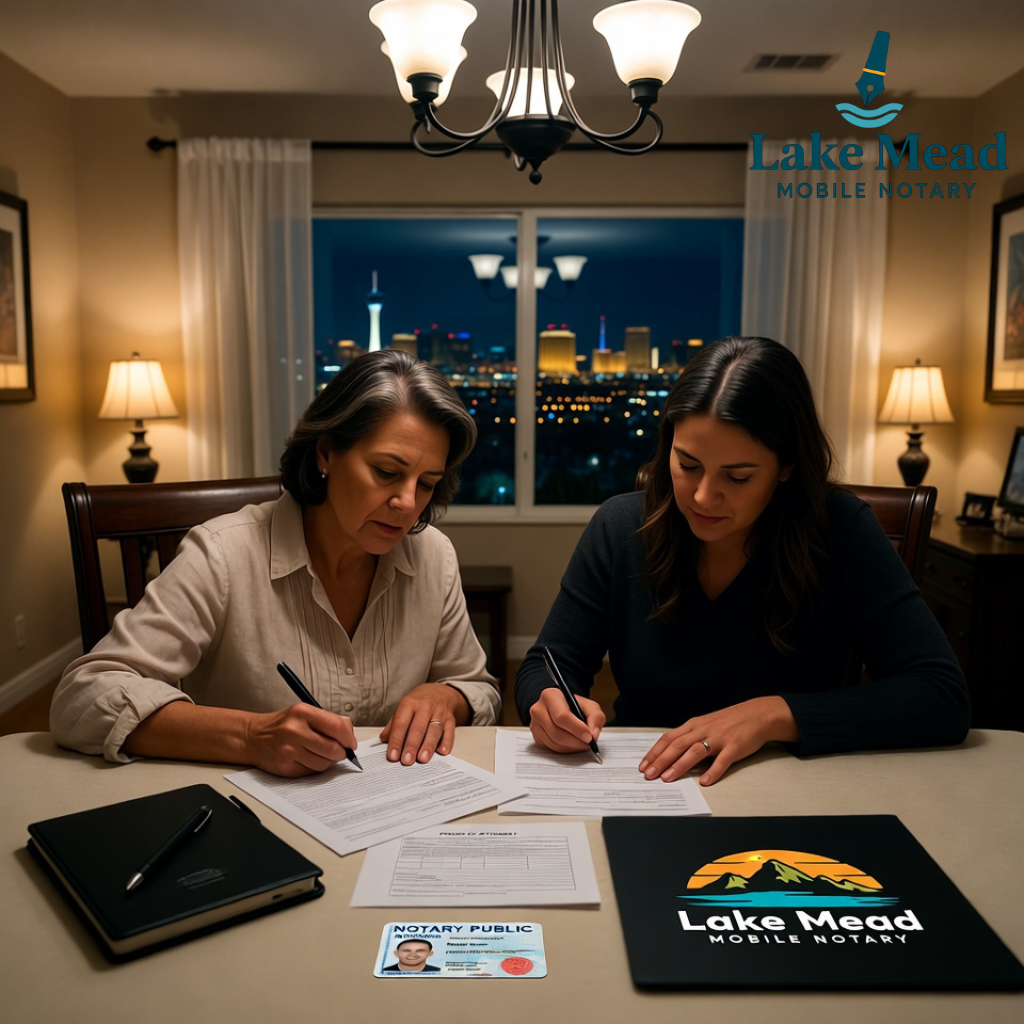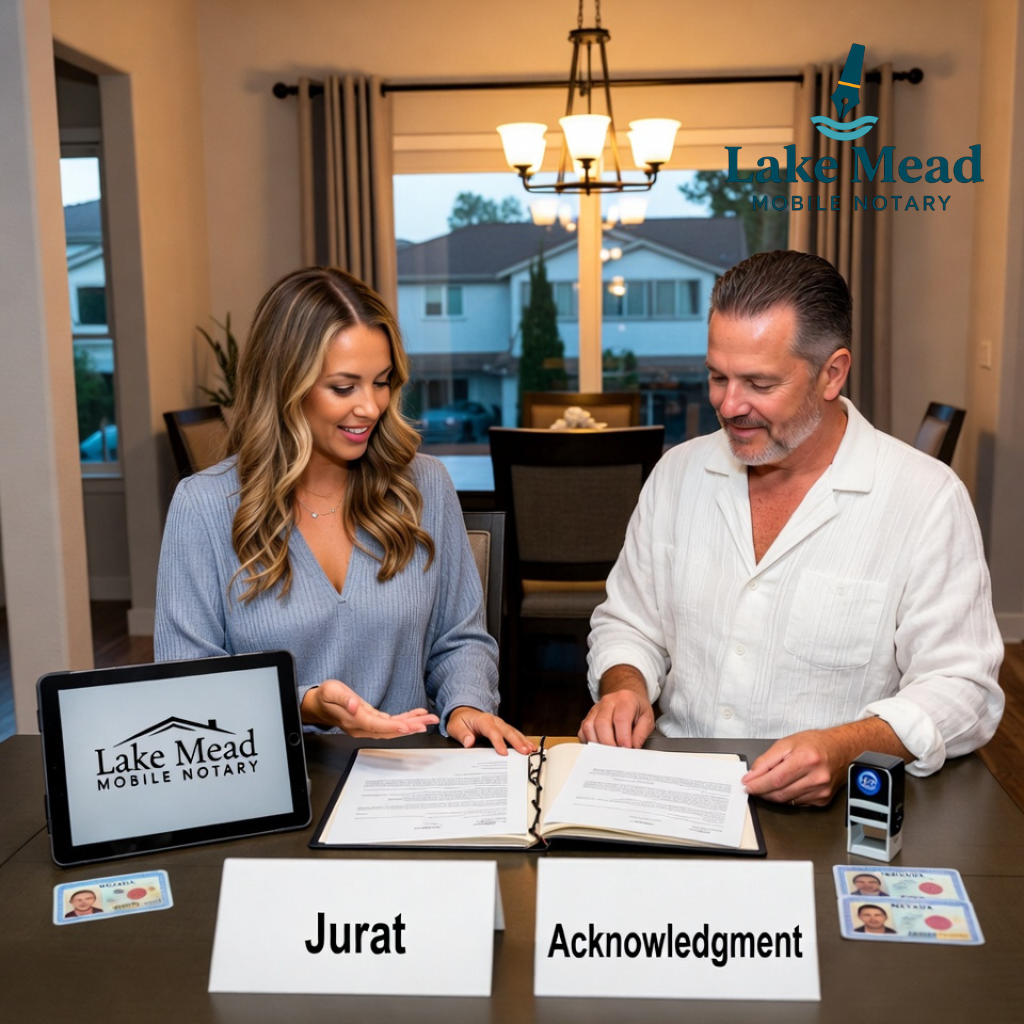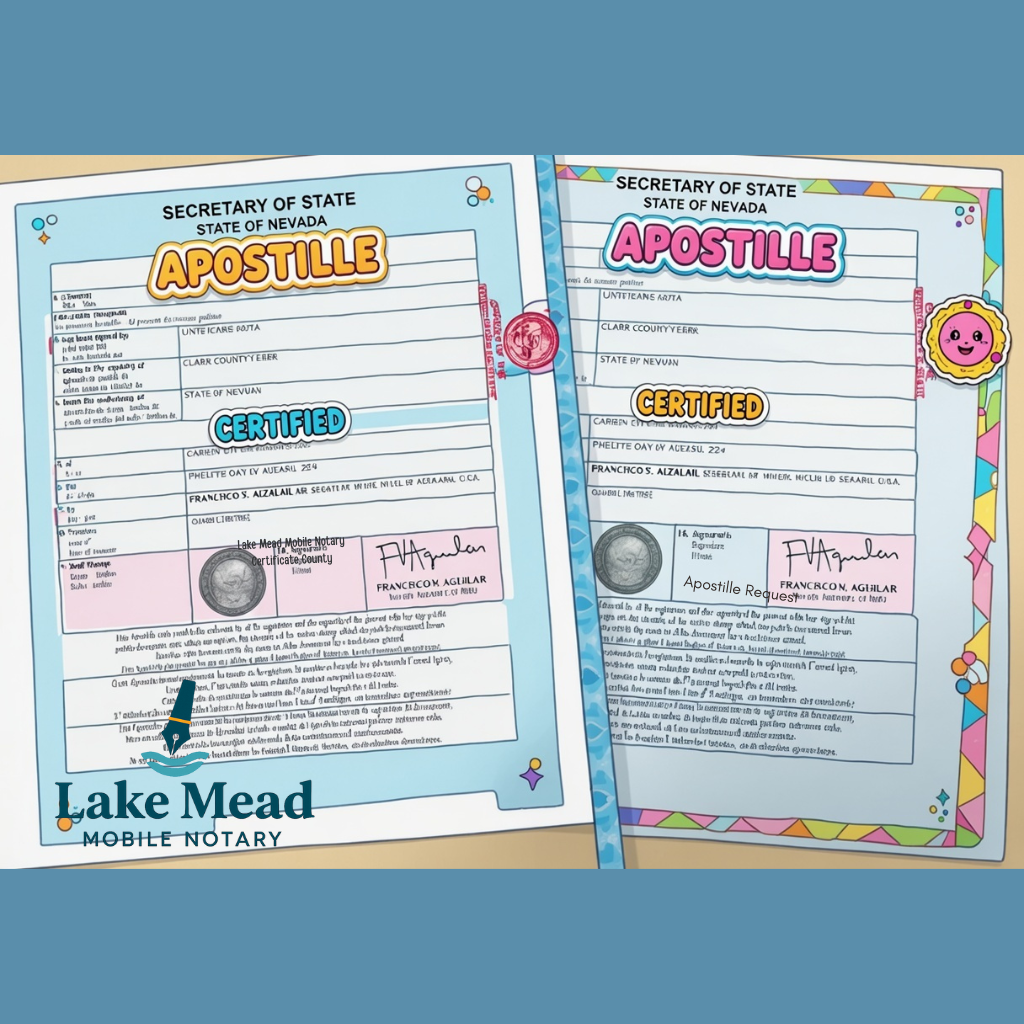Mobile Notary for Banks & Financial Institutions Las Vegas: Complete 2025 Guide

Banks and financial institutions throughout Las Vegas increasingly limit or refuse notary services for non-bank documents, creating significant challenges for business owners, corporate clients, and individuals requiring notarization of financial documents, estate planning instruments, and business contracts. While most Nevada banks historically provided free notary services to account holders, recent policy changes prioritize operational efficiency and liability reduction by restricting notarizations to bank-prepared documents only—refusing powers of attorney, living trusts, business agreements, and third-party legal forms. Lake Mead Mobile Notary provides specialized mobile notarization services for banks, credit unions, and financial institutions throughout Las Vegas, Henderson, North Las Vegas, and Clark County when in-house notaries are unavailable, restricted, or overwhelmed. Licensed Nevada notaries travel directly to bank branches, corporate offices, and financial institution locations to notarize business account documents, signature cards, corporate resolutions, loan agreements, commercial contracts, financial powers of attorney, trust documents, and estate planning instruments requiring immediate execution. Common situations include banks refusing to notarize estate documents due to liability concerns, credit unions unable to provide notary services during peak hours, financial advisors requiring urgent document notarization for investment transactions, and business banking clients needing multiple documents notarized simultaneously for account openings, corporate restructuring, or commercial loan closings throughout Southern Nevada.
Mobile notary services for banks and financial institutions solve the growing problem of limited in-house notary availability and policy restrictions that prevent banks from notarizing non-bank documents in Nevada. Lake Mead Mobile Notary provides specialized bank and credit union document notarization at branch locations, corporate offices, and financial institution headquarters throughout Las Vegas, Henderson, and North Las Vegas with licensed Nevada notaries who travel directly to your banking location for same-day service.
This comprehensive guide covers why banks are refusing notarizations, common problems business owners face, types of financial documents requiring notarization, and how mobile notary services support banks, credit unions, and financial professionals when in-house options aren't available.
For decades, banks provided complimentary notary services to account holders for virtually any document. However, starting in the mid-2010s, many financial institutions implemented strict policies limiting or eliminating notarizations for documents not prepared by the bank itself.
Estate planning documents (wills, trusts, powers of attorney) carry long-term legal consequences and are more likely to be challenged in court years after execution. If a bank notary improperly notarizes a signature or fails to follow exact formalities, the institution—and potentially the notary personally—could be drawn into costly litigation.
Powers of attorney are particularly risky because they can be abused. Banks worry about validating documents that later prove to involve elder financial abuse, coercion, or fraud.
Most banks now maintain policies allowing staff notaries to notarize only:
Many institutions have blanket policies against notarizing "third-party legal documents" not prepared or reviewed by the bank's legal team—especially estate planning, family law, business contracts, or real estate documents.
Notary services are time-consuming and require specialized training. With increasing complexity of financial services and customer demands, banks find it more efficient to allocate resources to core banking functions rather than providing notary services for external documents.
Additionally, staffing shortages mean banks may have only one or two notaries per branch. During peak hours, those notaries prioritize bank business over non-banking notarizations.
Estate documents often require specific witness rules (typically two disinterested witnesses plus notarization), which banks aren't equipped to provide. Branch staff may be untrained on state-specific formalities and worry about unintentionally invalidating important legal documents.
Common Scenario: "I went to my bank to have my living trust notarized—the same bank where I've been a customer for 15 years. The branch manager said they can't notarize wills, trusts, or powers of attorney anymore due to 'bank policy.' They told me to find a mobile notary or go to UPS Store. Why won't they help their own customers?"
Why This Happens: Most major banks (Bank of America, Wells Fargo, Chase) implemented policies around 2015-2018 prohibiting branch notaries from notarizing estate planning documents while on the job. The liability risk and potential for litigation years later simply outweighs the goodwill of providing free notary services.
Solution: Lake Mead Mobile Notary provides specialized estate planning document notarization throughout Henderson, Summerlin, and Green Valley. We understand Nevada's specific requirements for powers of attorney, living trusts, and advance directives.
Common Scenario: "I'm investing money with my financial advisor and needed some paperwork notarized. I went to my bank where I've had accounts for years, and the banker refused to notarize it. He said he wouldn't help because we weren't investing through his bank. Is this even allowed? Other branches of the same bank have notarized documents for me before."
Why This Happens: Bank notaries employed by one financial institution often won't notarize investment documents for competing financial services firms. This isn't legal discrimination—it's a conflict of interest policy. The notary works for the bank and shouldn't be facilitating transactions that benefit competitors.
Solution: Mobile notary services are independent third parties with no conflicts of interest. We notarize investment documents, brokerage account forms, retirement account transfers, and financial advisor paperwork regardless of which institutions are involved.
Common Scenario: "I needed a business contract notarized and went to my business banking branch. They said their notary can only notarize bank forms—not outside business documents. I had to reschedule an important meeting because I couldn't get the contract notarized in time."
Why This Happens: Banks are in the business of banking, not notarization. Many have cut back on offering free notary services for non-banking documents because it takes time and resources away from revenue-generating activities. Business contracts, vendor agreements, and commercial leases fall outside most banks' notary service scope.
Solution: Lake Mead Mobile Notary specializes in business and corporate document notarization throughout Downtown Las Vegas, Paradise, and Spring Valley business districts, traveling to offices for same-day service.
Common Scenario: "I called my bank to see if their notary was available. They said she works Monday, Wednesday, Friday from 10am-2pm only. I work those hours and can't take time off. Why don't banks have notaries available during normal business hours?"
Why This Happens: Banks typically have one or two notaries per branch, and notary duties are secondary to those employees' primary banking roles (teller, personal banker, branch manager). When they're helping customers with accounts, loans, or other banking needs, notary services aren't available.
Solution: Mobile notaries work around YOUR schedule, not bank hours. We provide evening, weekend, and emergency notarization appointments at your office, home, or preferred location throughout Clark County.
When banks can't or won't provide notary services, mobile notaries fill the gap by traveling to convenient locations throughout Las Vegas Valley.
We meet clients at bank branches, credit unions, or financial institution offices throughout Las Vegas, Henderson, and North Las Vegas. This is particularly useful when:
For business banking clients, we travel directly to corporate offices, business locations, and executive suites throughout Summerlin, Green Valley, and Downtown Las Vegas to notarize:
Financial transactions don't always happen during banking hours. We offer evening, weekend, and emergency notarization appointments for urgent situations including:
When financial transactions require multiple documents notarized or multiple parties signing, mobile notaries coordinate the logistics:
Banks historically offered free notary services as a customer benefit to build goodwill and loyalty. However, notary fees are regulated by state law and capped at nominal amounts (Nevada allows $15 per signature as of 2025). The minimal revenue doesn't justify the time, training, liability risk, and staffing costs. That's why banks are moving away from providing notary services entirely rather than charging for them.
No. Banks have the right to set policies about which documents their employee notaries can notarize. Being a customer doesn't entitle you to notary services, especially for non-banking documents. Bank notaries are independent professionals who must follow state law and can refuse notarizations that violate bank policy, create conflicts of interest, or present legal risks. Your best option is to use an independent mobile notary service.
While bank notaries were traditionally free for customers, the true cost was hidden in banking fees, account minimums, and service charges. Mobile notary services charge $75-150 for appointments (including travel) but provide significantly more value: flexible scheduling, travel to your location, experience with complex documents, no policy restrictions, and availability when you need them—not just when bank schedules allow. For business clients, the cost is minimal compared to the time saved and convenience provided.
This is unusual but can happen if the bank's notary is on leave, unavailable, or if the document requires multiple witnesses the bank can't provide. In this situation, request that the bank's legal department specify exactly what type of notarization is required (acknowledgment, jurat, signature witnessing) so an independent mobile notary can complete it properly. Most banks will work with you to facilitate external notarization for their own documents.
Lake Mead Mobile Notary provides same-day service with 1-2 hour response times for urgent situations throughout Las Vegas Valley. For after-hours emergencies (closing deadlines, urgent investment transactions, health-related estate planning), we offer expedited service with premium fees. Call (702) 748-7444 for immediate assistance or book online at https://lakemeadmobilenotary.com/book for scheduled appointments.
🏢 Business Contract Notarization
Mobile notarization of commercial contracts, vendor agreements, service contracts, and business partnerships throughout Las Vegas business districts.
📋 Corporate Resolution Notarization
Notarization of board resolutions, shareholder agreements, corporate bylaws, and operating agreements for banking and business transactions.
💼 Financial Power of Attorney Notarization
Specialized notarization of durable powers of attorney for financial matters, banking authority, and investment management decisions.
📝 Loan Document Notarization
Notarization of personal loans, business loans, promissory notes, and commercial lending documents at convenient locations.
⚖️ Financial Affidavit Notarization
Sworn affidavits for financial status, asset declarations, income verification, and banking-related sworn statements.
No. Banks do not typically notarize deposit slips, even for large cash deposits ($10,000+). Banks are required by federal law (Bank Secrecy Act) to report large cash deposits to the IRS via Currency Transaction Reports (CTR), but they don't use notarized deposit slips to satisfy this requirement. Bank notaries often refuse to notarize deposit slips because deposit slips are transactional documents, not legal documents requiring notarization.
What Banks Actually Require for Large Deposits:
Banks rely on their own internal reporting procedures for IRS/AML (Anti-Money Laundering) compliance, not notarization. Deposits over $10,000 trigger automatic CTR filing—this is mandatory reporting, not optional protection. Notarization of deposit slips adds no legal value and creates confusion about why it's requested.
💰 When Notarization Might Be Confused with Deposit Requirements:
⚖️ What Actually Needs Notarization for Bank Compliance:
If your situation involves Gift Letters or Affidavits explaining the source of deposits, those documents may require notarization. Contact your bank's legal or compliance department to clarify exactly which supporting documents need notarization. Professional notary services in Vista Pointe and Summerlin provide same-day notarization for legitimate compliance documents.
Banks are unlikely to provide notary services after regular business hours (typically 5pm weekdays, closed weekends). If your corporate resolution requires notarization outside bank hours—Friday evening board meetings, weekend closings, or emergency approvals—you must use a mobile or after-hours notary service that offers extended or 24/7 availability.
Why After-Hours Corporate Notarization Is Critical:
Corporate resolutions often have time-sensitive deadlines. Board meetings frequently occur after standard office hours, and waiting until Monday morning can delay business deals, loan closings, or emergency actions. Nevada notary law does not restrict notarization to business hours—commissioned notaries can notarize anytime, anywhere within the state.
🕐 Common After-Hours Corporate Scenarios:
✅ Mobile Notary Advantage:
Mobile notaries provide flexible scheduling including after-hours emergency service in Advanced Health Care and Seven Hills. Same-day and next-business-day appointments ensure your corporate approvals are notarized without delay, keeping business on track.
It depends on your specific bank's policy. Some banks require their in-house or affiliated notary to notarize signature cards for security and documentation purposes. Other banks accept notarizations from independent or mobile notaries as long as they're commissioned in Nevada and meet state requirements. The policy varies by institution and sometimes by branch, so always confirm with your bank's signature services or compliance department before using an outside notary.
Why Banks Restrict Signature Card Notarization:
Signature cards are foundational documents for account security. Banks want control over the notarization process to ensure standardized procedures, proper identity verification, and coordination with their compliance systems. If their in-house notary is only available limited hours (e.g., Tuesdays), they may create customer access problems—but this is a bank operations issue, not a legal one.
🔐 What You Can Do:
🚀 Workaround:
If your bank refuses outside notaries and their notary has limited availability, mobile notaries in Lake Mead Health Rehab and Rancho Bel Air areas can coordinate with bank staff or provide documentation that meets Nevada requirements. Some banks will reconsider when faced with professional credentials and proper notarial certificates.












